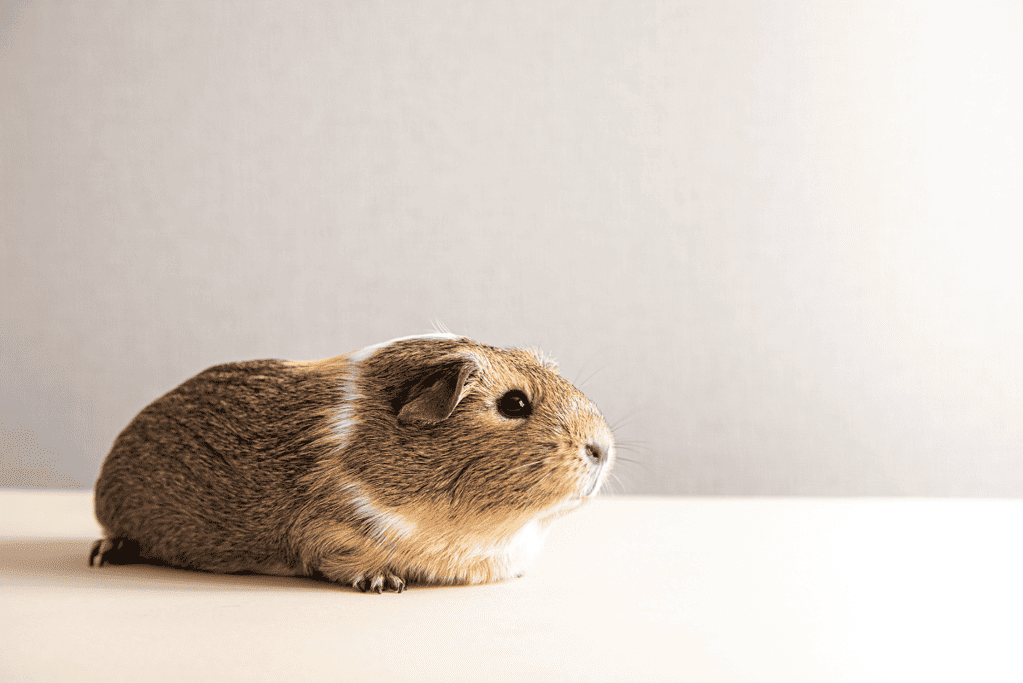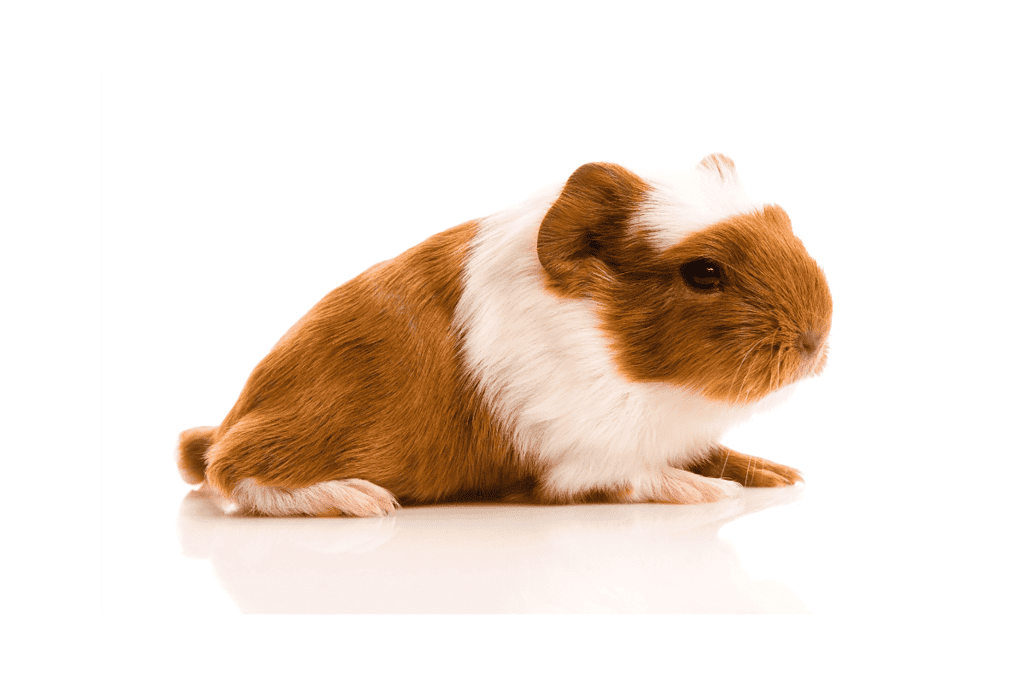After my first experience with my guinea pig Porky I was shocked to learn the answer to this question. I am glad that I had an unusually long time with my first one. The following 2 did not live as long, but we were just as happy with them. I will let you know what to expect with the lifespan of the guinea pig.

How Long Do Guinea Pigs Live?
The average life span for a guinea pig is 6-8 years. Some breeds of guinea pigs have a little longer lifespan than do others. Barring injury and illness you should plan on having your pet for a long time. I will cover things to watch for, as your guinea pig ages later.
My Porky was 14 when he departed. He lost his hearing at 11 and most of his sight was gone. Guess to him we were all a bunch of stinkers. But he was happy and would let you know he knew you were there. He wasn’t as energetic at the end but he still loved to spend time out of his cage with us.
Can You Tell How Old A Guinea Pig Is?
There are some things that can give you a general idea of how old your guinea pig is but nothing that will pinpoint the exact age. If you get a guinea pig in a pet store you can figure that it is 8-12 weeks old. At this point, it should still be able to sit in one hand palm open.
Size Guide & Changes

ages 0-1
Guinea Pig babies are born 3-4 inches long and weigh 100-110 grams. They will double in size by 8-12 weeks and be 6-8 inches long and weigh 1.5-2 lb. After this period they will slow down in their growth. They will grow to 8-10 inches and weigh 3.5-4 lb. by 1 year.
This is the adolescent phase for a guinea pig. By the time they are 1 year old, it is like 10 years in human life.
They are born with sharp white teeth that will grow for the rest of their lives as they get older their teeth will not look as white or be as sharp. This is one indication of aging.
They have straight white thin toenails when they are born and these will round out become much firmer and turn opaque and then curving and yellowing as they age.
Ages 1-3
They will finish growing by about 14 months. Most breeds reaching 10-12 inches long. Rex’s can grow up to 17 inches long. They will weigh 3.5-4.5 lb.s. You should weigh your guinea pig 1 a week. Any drastic changes in weight can be a good detection of illness.
After the first few months of this stage, there are no changes in size and weight. This is the young adulthood phase for a guinea pig. By the time they reach 3 it is like 30 to a human.
This is when you will notice changes in the teeth and toenails. They should still have a robust appetite and plenty of spunky energy. This is when they will be the most comfortable with life.
Ages 3-5
This is when you will start to see them slow down a little. Their fur may start to turn gray around the mouth and nose. They may start to nap more and eat a bit less. These are the silver years and pushing on to golden.
They may start having trouble with their front feet turning out and their toes thickening and curling outward. This can cause bumblefoot. You will want to have your vet check this out.
Ages 5-7
These are the golden senior years equivalent to 50-70 years in humans. The fur has continued to get greyer, and they are considerably less active and slower than in their youth.
Guinea pigs can suffer from some of the same things a human can like stroke, heart attack, diabetes, pneumonia, bladder stones, kidney disease, arthritis, and cataracts. At this stage, they will want to more snuggling and less playing.
They may need more help from a vet for their teeth. If you see them dropping their pellets and not wanting to eat the more crunchy vegetables have a vet take a look before it gets to late. A guinea pig that has problems with its teeth can actually starve to death.
As with all living things, you will notice changes over time, and at the very early and the later stages is when it is the most noticeable. I will give you some more information on things to do that will help extend the best years of your guinea pig.
Diet At Each Age Group
0-1 Year
A young guinea pig has needs that will help them grow strong and healthy as they are changing and growing rapidly. Until they are 6-8 months they will need more calories and nutrients than do adult cavy’s
For the rapidly changing young cavy, you will want to give them a diet that is high in the alfalfa hays. Mixing alfalfa hay, timothy hay and orchard hay will give the young guinea pig a variety and all the nutrition need in the hay. This should be the bulk of their diet about 70%-75%.
There are also alfalfa pellets fortified with vitamin C that you will need to give your young Guinea pig. You will want to give them about ½ cup of pellets each day. You can give them 1 or divide it into 2 times per day. This will make up about 20%-25% of their diet.
The rest of their diet about 5%-8% should be mostly fresh vegetables and a little fresh fruit.
At about 8 months you will want to start slowly eliminating the alfalfa for a more stable timothy and orchard hay and pellets, taking the alfalfa out slowly and adding in other hays will help keep their digestive system in balance. They should be weaned off the alfalfa hay before they are 1 year old.
1 to 5 Years
Continue supplying your adult guinea pig with a variety of hay to ensure a more nutrient-balanced diet. Only offer the alfalfa as a treat occasionally. Also switching their pellets to a non-alfalfa-based pellet. Continue to give fresh vegetables and some fruit to complete their diet through their adulthood.
5+ years
At this point, you will want to continue to give your cavy what you always have unless you notice they are having a problem with it. Then consult your vet and see if he can help you find what will work best for your guinea pig. There are times the vet is the only one to know what is going on and how to prevent trouble.
You may have to really encourage them to get the daily exercise that they need. Especially if they have developed arthritis or bumblefoot. But unless otherwise instructed by your vet it is essential to keep them moving.
At this stage in their lives, it is even more important to have vet visits regularly. You may want to consider every 6 mo. instead of 1 a year.
How To Make Sure Guinea Pigs Stay Healthy
Make sure to give your guinea pig a good going over every day, checking to see if there is any drooling, draining from the eyes, nose, or ears. Check for scrapes or abrasions over the body, or if they are pulling out their hair.
Keep track of their weight on a weekly basis if there is a sudden drop it could mean problems. Watch to make sure their eating and drinking habits don’t change.
With a proper diet and daily checks, you should catch any problem early on. When you catch a problem contact your vet immediately.
